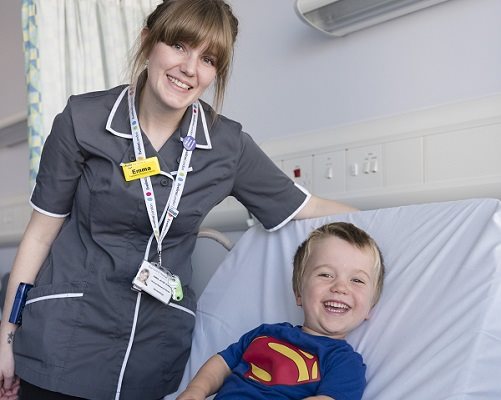Helping to find cures and treatments
Posted on Wednesday 17th May 2017

Clinical research nurse Emma Glass and a patient.
To celebrate International Clinical Trials Day 2017 on Friday 19 May, Emma Glass explains what it means to be a clinical research nurse.
The work of the Evelina London research department involves testing new medicines and treatments to make sure they are safe and finding new ways to support children and families. Our research includes studies of new medicines and devices (known as clinical trials) as well as studies that observe how children grow and learn.
Emma Glass is a clinical research nurse at Evelina London, she shares more about her job and why she became a research nurse:
“I wanted to be a part of the process of discovery and innovation. Being a research nurse means I can help to find evidence to improve treatment and care of children and their families.
I’ve been a research nurse at Guy’s and St Thomas’ NHS Foundation Trust for almost three years. I became interested in research whilst working on the immunology, cancer and infectious diseases unit at Great Ormond Street Hospital. Many of the children I nursed had rare conditions and would receive pioneering medications through research trials.
The role of a research nurse is hugely varied. Some days I work directly with children, giving research medications to children on research trials and looking after all aspects of their care. Other days, my time will be spent reading through protocols and research proposals and working with the research team to decide whether a study has enough scientific evidence, is ethical (right for our patients) and possible to do at Evelina London. The research team is made up of a mix of different specialists including doctors, nurses and pharmacists.
I am lead nurse for a clinical trial for children with achondroplasia, a rare genetic disorder which effects the growth of bones, it’s sometimes known as dwarfism. The research treatment is a medication which could help improve the rate at which the children grow. My role is to coordinate each element of the trial, including: arranging hospital appointments and investigations, teaching parents and caregivers how to give the medication, taking blood samples and collecting growth data. It’s exciting to think that what we learn from the trial could change treatment for children with achondroplasia.
Developing a connection with children on clinical trials and nursing them throughout their time as research participants is the most rewarding part of my job.
It’s really important that children understand their treatment so I ensure all aspects of their care is explained. One of our patients brought a rubber toy egg to his very first visit and took it with him to each of his appointments. Every investigation that he underwent, his egg also did. Once our radiologists were extra nice and “x-rayed” his egg - it was the first time they had ever x-rayed an egg!
This job also keeps me on my toes. All our clinical investigations take place in different parts of the hospital and moving around the hospital can be quite tiring so we encourage our achondroplasia patients to bring their scooters. I race the children to their next appointment and they always beat me, it does help me to keep fit though. The children are treated like celebrities when they come, staff and patients recognise them scooting through the departments.
The best thing about being a research nurse is working with children and families who are motivated to take part in research and dedicated to helping to find treatments and cures. Research now is vital to helping children in the future.”
Find out more about what’s happening at Guy’s and St Thomas’ Hospitals to celebrate International Trials Day on Friday 19 May.